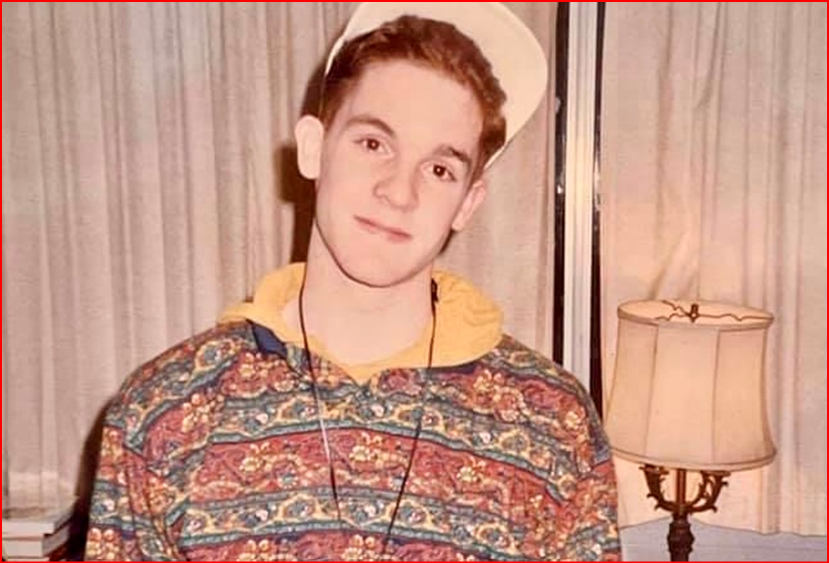Springsteen's Opus (A World AIDS Day Reflection)

Author’s note: This essay debuted on April 13th 2023 to coincide with Bruce’s Newark sold-out shows. We’re running it again today to commemorate World AIDS Day.
"Streets of Philadelphia" is the greatest, most influential song in the Springsteen songbook. Fight me. If you dare.
Tonight Bruce Springsteen wraps the first leg of his American tour at home in New Jersey.
With the E Street Band in tow for the first time since 2017, Bruce will pack the Prudential Arena in Newark before kicking off the European portion of his farewell (?) tour.
Every Bruce fan has their favorite Springsteen moment. Mine's the time he went to East Berlin in 1988 as part of his "Tunnel of Love Express" tour. The story how Bruce and the gang landed behind the Iron Curtain is bonkers and fascinating. And the concert itself, 32 songs to a crowd of roughly 300,000 rock-n-roll-starved East German fans looks absolutely surreal, especially song #21, "Dancing in the Dark."
The song begins with a baby-faced Max Weinberg doing what he does best; bangin' on those drums. But (the late) Clarence Clemons' iconic sax solo towards the end portended pure magic. As Clarence worked the crowd into a frenzy, Bruce plucks an unsuspecting (braless) East German girl from the crowd for a spin around the stage. The look on her face (and roar of the crowd) are all the proof I need that art can indeed change the world.
The Berlin Wall fell 18 months later.
[caption id="attachment_146494" align="alignnone" width="2048"] Springsteen[/caption]
Springsteen[/caption]
So East Berlin '88 will always be my favorite Bruce Springsteen moment of all time.
But this isn't about favorites.
I'm here to argue which song from Bruce's cannon is the best.
"Streets of Philadelphia" was written and performed for the 1993 movie Philadelphia starring Tom Hanks as an attorney who was fired for having AIDS. The song won 4 Grammys and an Oscar, so on that basis alone, "Streets of Philadelphia" is easily Springsteen's best ever.
Let's take a look at the lyrics and you can decide for yourself.
I was bruised and battered
I couldn't tell what I felt
I was unrecognizable to myself
Saw my reflection in a window
And didn't know my own face
Oh brother are you gonna leave me wastin' away
On the streets of Philadelphia?
I was out for a night of fun when a very handsome stranger sauntered up to take his shot. It worked.
We practiced safe sex at first and then we didn’t and that’s how I became HIV positive.
I was 19 years old at the time. This was 1992, a year before Bruce first performed "Streets of Philadelphia."
To have such massive (heterosexual male) mega-stars like Tom Hanks and Bruce Springsteen (as well as Denzel Washington and Antonio Banderas) depict an AIDS story sympathetically was truly revolutionary.
I was still in denial about my HIV status when Philadelphia hit the big screen and hardly in a position to contemplate how art can change the world. But it's obvious in retrospect this song did just that.
My longevity proves it.
Oh brother are you gonna leave me wastin' away
On the streets of Philadelphia?
I was 25 and still healthy when my doctor put me on HIV meds to keep me that way.
Despite their life-saving properties, those early pills also had a downside, in my case side effects like nausea, vomiting, headache, dizziness. There were sudden hot flashes and night sweats followed by intense chills that left me convulsing with shivers.
And then there's the diarrhea, humbling and unpredictable, and always in charge of my life in those days.
Few things are more humiliating than waking up soiled, panicked, and dehydrated. Each bout was a cruel reminder of wasting away to skin and bones, my gaunt reflection staring back at me, a witness in the mirror to my own disintegration.
Saw my reflection in a window
And didn't know my own face
Then to top it off, there’s that whole pesky bedlinen situation to manage before going back to bed.
The whole scene was ghastly.
But it’s a lot better than dying of AIDS.
Bruce was able to distill all that into 14 words: Oh brother are you gonna leave me wastin' away, On the streets of Philadelphia?
That's why they call Springsteen a poet.
And that's why I call this the greatest Springsteen song ever written.
I walked the avenue, 'til my legs felt like stone
I heard the voices of friends vanished and gone
At night I could hear the blood in my veins
Just as black and whispering as the rain
On the streets of Philadelphia
“Let’s do the test one more time,” my Doctor said, sounding slightly concerned but with a soothing tone that made it seem maybe not so bad.
But is was bad.
Another test confirmed severe anemia. In a cruel twist, the same pills which saved me from AIDS destroyed my bone marrow’s ability to produce red blood cells and hemoglobin. Red blood cells basically oxygenate every cell and every organ in your body.
The Doc said he rarely saw a result so abnormal then summoned an ambulance (!) to send me straight to the hospital.
I realized how bad when they had me in a hospital bed without proof of insurance. The blizzard of paperwork came later but first they were like “Stat! Stat!” getting that IV picc line into my arm as quickly as possible, just like on TV.
I desperately needed blood transfusions, six bags in all, spread over 3 days spent at Jefferson Hospital in Philadelphia (yes, really) where my life most resembled the song I'm writing about.
"At night I could hear the blood in my veins, Just as black and whispering as the rain"
This again demonstrates Bruce Springsteen's ability to inhabit the characters he's writing about, in this case someone ravaged by AIDS.
I spent a lot of time obsessing about (and fearing) the toxic blood in my veins. Toxic because of the disease. Toxic because of the meds. And most of all, toxic because of the stigma that persists all these years later.
In the song's opening line: "I was bruised and battered I couldn't tell what I felt", Bruce may have been referring to the lesions worn by many with advanced AIDS, including Tom Hank's character in Philadelphia. Those cancerous lesions (medical name: Karposi Sarcoma) were a common symptom back then which makes the "bruised and battered" line so flawless.
Bruised and battered and covered with lesions, yes. But also bruised and battered from the exhaustive lab work. Bruised and battered from that 72 hour IV catheter saving my life from anemia. But mostly bruised and battered by a neglectful society that needed a very large bodycount before starting to care.
And finally, bruised and battered because I'd become an IV drug user with track marks up and down my arms. I rarely mention my battle with HIV and with drugs in the same breath. I've always been keen to avoid conflating those two things to somehow dodge responsibility for my appalling behavior during my junkie phase.
I never wanted to blame my drug habit on anything else besides my own bad judgment.

And it wasn't long before I was shooting meth pretty much on a daily basis up until 2003 when I checked into rehab.
If Bruce Springsteen is reading this, he can take comfort knowing that nowadays my clothes fit me just fine. And thanks to a healthy-ish lifestyle and tons of weed, I'm close to my peak fighting weight, no small feat after a 31+ year tango with the AIDS virus.
Ain't no angel gonna greet me
It's just you and I my friend
Those 13 heartbreaking words capture the gloom and doom of the era I came out in. When HIV was a death sentence, we all assumed our turn would come. We figured that one day, a cough or a strange blister would appear to herald the beginning of the end.
The only question is would we die comfortably?
Or would we die alone and in quarantine?
And my clothes don't fit me no more
A thousand miles just to slip this skin
Whether it was the disease or the HIV meds or the meth habit, my weighted bottomed out at 120 pounds.
My gaunt, emaciated appearance was accentuated by my clothes, suddenly baggy and billowing, that seemed to swallow me whole. Naked, I could almost fake it as a really skinny twink. It was the age of "heroin chic" in a society that will always prize thinness, even the unhealthy kind.
But to see me swimming in my clothes betrayed me and revealed just how sick and foregone I'd become. Frankly it was mostly the meth but that didn't stop people assuming I was dying of AIDS because that's what it looked like from the outside.
The night has fallen, I'm lyin' awake
I can feel myself fading away
So receive me brother with your faithless kiss
Or will we leave each other alone like this
On the streets of Philadelphia?
I can not emphasize enough how perfect this last stanza is. This is also where my life stops mimicking the lyrics of the greatest Bruce Springsteen song ever.
Geoffrey Bowers, the lawyer who inspired Tom Hank's character, perished in 1987. I was infected five years later in 1992 and thanks to a loving family, luck, and an immune system that held out just long enough for a treatment to emerge, I was part of first cohort of HIV+ Americans who got a reprieve.
Maybe the meth would kill me or even old age if I got my shit together.
But I won't die or AIDS. And that's because science and activism transformed HIV into something very different than what Bruce Springsteen sang about all those years ago.
And thanks to my drug regimen, I'm not even contagious anymore, something that would have seemed miraculous during the Philadelphia era.
Bruce 2023
Fans at tonight's Springsteen show in Newark won't hear "Streets of Philadelphia" and that's probably a good thing. Plenty of soundtrack music is perfectly suitable for a rock-n-roll show and this ain't one of them.
This song, beautiful and haunting, would be a total buzzkill in a concert setting.
And so "Streets of Philadelphia" the greatest, most consequential Springsteen song of all time may never get a live performance ever again and that's ok.
It's still the greatest.
Jay Lassiter is an award-winning writer and podcaster based in Cherry Hill, NJ. He's been HIV+ over 31 years.






A truly great song...I remember those very dark days...great article, Jay. Deeply moving. And this is timely. My home city of Plainfield remains in the top 10 NJ municipalities for HIV/AIDS cases...la lucha continua. Best, Rebecca
Thank you
A brilliant, raw, and vulnerable argument. Thank you and so happy you’re doing well.
Very glad that you're still with us!
I was all set to argue that “New York City Serenade” is his greatest song until I read your personal story. Can’t compete with that! Bless you and your loved ones. Continued health and happiness my fellow tramp.
Thank you for this.
Thank you Jay for opening your heart while writing this testimony. There are two songs in Bruce's catalog that bring me to tears every time I hear them - Streets of Philadelphia and 41 Shots/American Skin. Neither are uplifting, but boy are they still relevant today, sadly.
A fine read, thank you!
Agreed, Jay. Brilliant song. Beautiful testimony!
This was a great article and, while I do not have the personal connection to the lyrics of the song that the author has, I agree that it probably Springsteen's best.